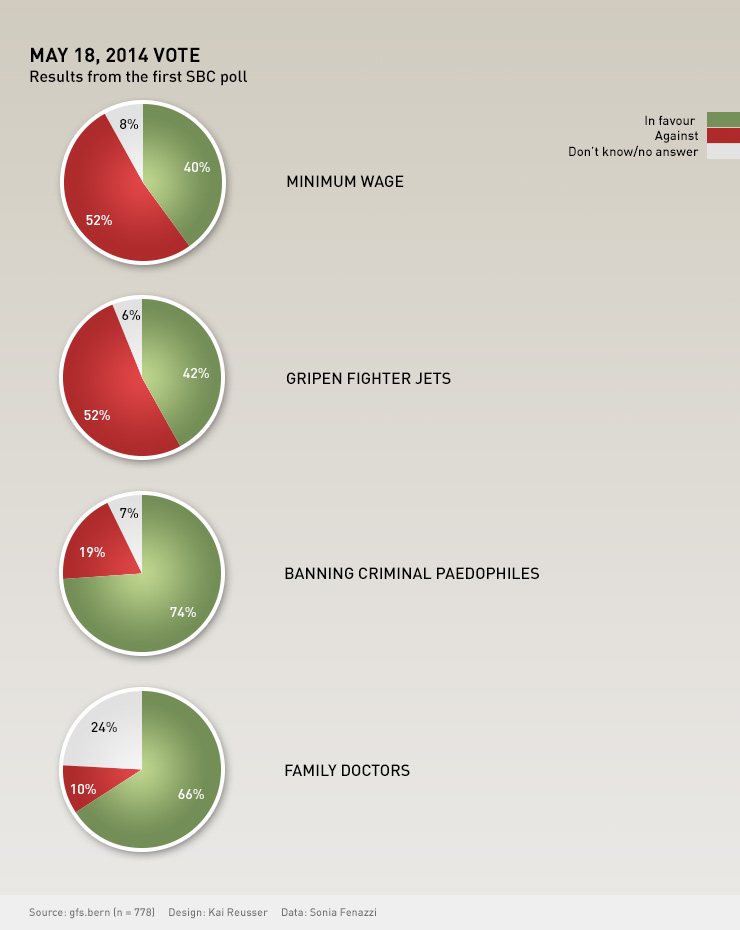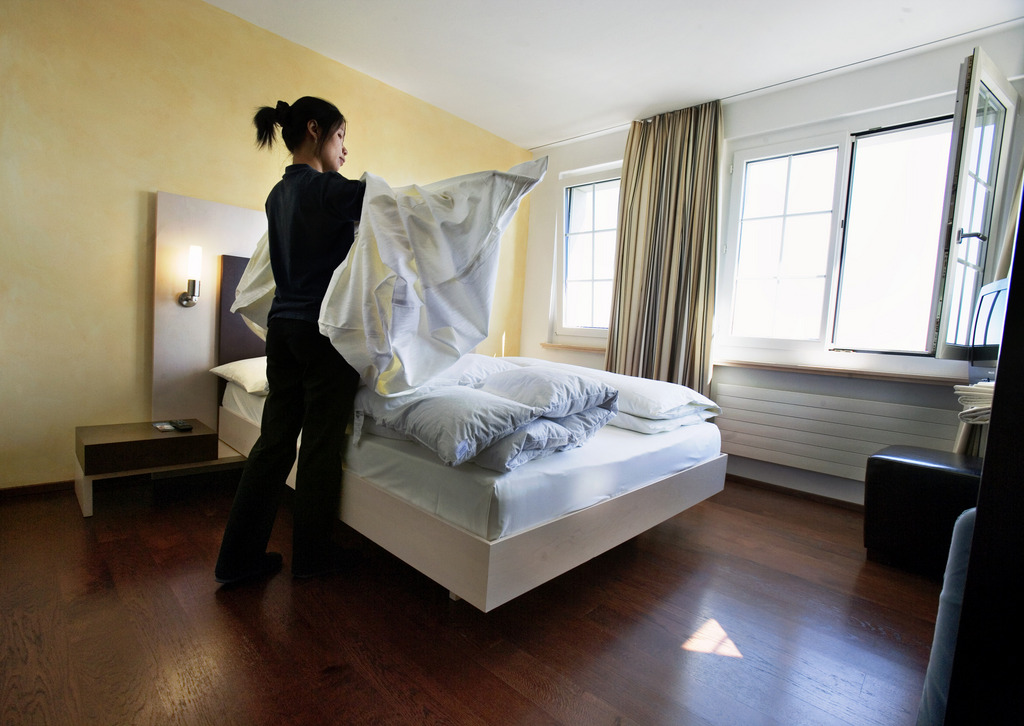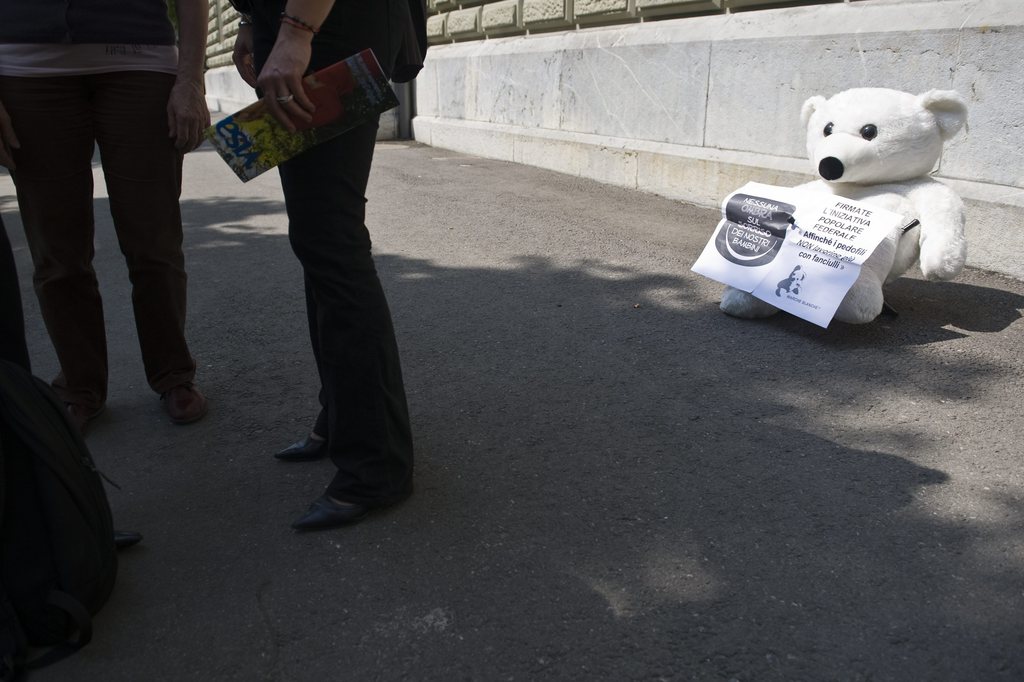Minimum wage fails to seduce Swiss

Swiss voters are unlikely to back the introduction of a minimum wage, according to an opinion poll ahead of the May 18 ballot. But a plan to buy new fighter jets could win a majority.
Political scientist Claude Longchamp says the trade unions have little chance of winning a majority for their initiative to set a CHF22 ($25) minimum wage per hour.
A first survey by the leading GfS Bern research and polling institute, published on Friday, gives the proposal just a 40% backing against 52% for the opponents. (Detailed results see graphic below)
“It is not a comfortable situation for the promoters of the initiative,” Longchamp says. But he is not surprised by the findings.
“The political left in Switzerland has traditionally been fighting an uphill battle with proposals aimed at a re-distribution of income and wealth,” he says.
Longchamp says the campaign resembles a nationwide vote last November that sought to limit the salary of the highest paid employee of a company to 12 times that of the lowest paid.
The initiative was thrown out by more than 65% of voters and Longchamp expects a similar result for the minimum salary proposal on May 18.
The government and the business community have come out against the initiative as have most political parties, except for the Social Democrats and the Greens.
The debate has pitted economic interests against questions of ethics in a fair society. “It is about social justice versus jobs,” Longchamp points out.
Opponents have warned that a minimum wage would destroy low-skill jobs and lead to state interference in salary issues. For their part trade unionist campaigners have been fighting for what they see as fair salaries, targeting exorbitant manager pay packages.

More
First SBC opinion poll
Up in the air
A closer vote is expected on whether Switzerland should spend CHF3.1 billion to buy 22 JAS-39 Gripen fighter jets from Swedish manufacturer Saab.
“At this stage both a yes or a no majority are equally probable,” says Longchamp, even though at this stage in the campaign opponents of the purchase – led by centre-left parties and pacifist groups – have a 10% lead.
Supporting the Gripen acquisition is a broad alliance of mainly centrist and rightwing political parties as well as the business community and the government.
Longchamp expects them to launch a major policy debate about the armed forces to win more voters in the next few weeks.
“The grassroots in the two main centrist parties as well as those with no particular party affiliation will be decisive, as the issue of fighter jets has polarised the left and the right,” he says.
However, women and people in the French- and Italian-speaking parts of the country as well as younger voters appear to be less inclined to approve the multi-billion credit, according to the poll.
The fighter jet purchase is being put to a vote because pacifist groups challenged parliament’s approval of buying the Swedish jets. They argue it is a waste of money which would be better spent on education, research and welfare.
Taking the opposite stance, supporters claim the planes are a crucial element in the protection of Switzerland’s airspace and are needed to guarantee the country’s sovereignty.
The pollsters interviewed 1,209 Swiss citizens from across the country for the first of two nationwide surveys ahead of the May 18 vote.
Swiss expatriates were not included in the poll.
The telephone interviews took place between March 29 and April 4.
The margin of error is 2.9%.
The survey was commissioned by the Swiss Broadcasting Corporation, swissinfo’s parent company, and carried out by the leading GfS Bern research and polling institute.
Gut feeling
A third issue to come to a nationwide vote in May is an initiative seeking to ban convicted paedophiles from working with children ever again.
An overwhelming 74% of respondents in the poll said they would support the proposal.
Martina Imfeld, political scientist at the GfS Bern institute, says opponents find it difficult to counter the arguments of the initiative promoters.
“People trust their gut feeling and are less open to rational arguments,” she says.
The government, most centre-left parties as well as youth associations have come out against the hardline initiative, saying its wording is too strict and disproportionate.
Instead they favour a compromise law which leaves some discretion with the courts, which was approved by parliament and is due to come into force next year.
As for a constitutional amendment to boost the role of family doctors, nearly one in four respondents in the opinion has not yet made up his or her mind.
Turnout on May 18 is expected to be an average 45%.
Voters decide on four separate issues:
A proposal by trade unions to introduce a monthly minimum salary of CHF4,000 ($4,500) at a nationwide level.
The planned purchase of 22 Swedish Gripen fighter jets for the Swiss Air Force at a cost of CHF3.1 billion.
An initiative, sponsored by concerned parents, to ban for life convicted paedophiles from working with children.
A constitutional amendment to boost the role of family doctors in the country’s health system.
It is the second of up to four sets of nationwide ballots this year.
At the same time, elections and votes on a variety of issues take place at cantonal and local level.

In compliance with the JTI standards
More: SWI swissinfo.ch certified by the Journalism Trust Initiative





You can find an overview of ongoing debates with our journalists here. Please join us!
If you want to start a conversation about a topic raised in this article or want to report factual errors, email us at english@swissinfo.ch.